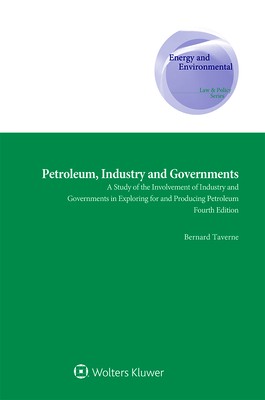
- Išsiųsime per 10–14 d.d.
- Autorius: Bernard Taverne
- Leidėjas: Kluwer Law International
- ISBN-10: 9403532300
- ISBN-13: 9789403532301
- Formatas: 15.6 x 23.4 x 2.1 cm, kieti viršeliai
- Kalba: Anglų
- Extra -15 % nuolaida šiai knygai su kodu: ENG15
Atsiliepimai
Aprašymas
The grave concern of governments for the negative impact on the world climate caused by the release into the atmosphere of CO2 resulting from human activity, and under human control, such as the burning and combustion of oil products from the refinery, of natural gas and coal (the fossil fuels) made it possible for the international community to agree to and establish a global climate agreement, viz. The Paris Agreement of 1915. In order to meet the objectives of this Agreement, governments will try (among other measures) to curb the consumption of fossil fuels. This will not be easy since, in particular in less advanced economies, fossil fuels are for the coming decades indispensable. In more advanced economies, there are alternatives available, but as long as a possible switching to nuclear fission energy meets with public opposition, even the more advanced economies will remain dependent on fossil fuels for the coming decades.
In its deeply informed discussion of the involvement of industry and governments with the production and use of petroleum, the prodigious scope of the coverage encompasses the following and much more:- technical and environmental aspects of the production of oil and natural gas;
- position and function of petroleum and natural gas in the economy;
- government policies and attitudes towards fossil fuels, particularly with respect to climate change;
- national and international regulation of onshore or offshore petroleum operations;
- how oil and natural gas markets work;
- old and new forms and manifestations of political risk;
- distinction between licence-based and contract-based petroleum legislation;
- production sharing agreements; and
- petroleum taxation.
EXTRA 15 % nuolaida
Kupono kodas: ENG15
Akcija baigiasi už 1d.14:19:44
Nuolaidos kodas galioja perkant nuo 10 €. Nuolaidos nesumuojamos.

- Autorius: Bernard Taverne
- Leidėjas: Kluwer Law International
- ISBN-10: 9403532300
- ISBN-13: 9789403532301
- Formatas: 15.6 x 23.4 x 2.1 cm, kieti viršeliai
- Kalba: Anglų
The grave concern of governments for the negative impact on the world climate caused by the release into the atmosphere of CO2 resulting from human activity, and under human control, such as the burning and combustion of oil products from the refinery, of natural gas and coal (the fossil fuels) made it possible for the international community to agree to and establish a global climate agreement, viz. The Paris Agreement of 1915. In order to meet the objectives of this Agreement, governments will try (among other measures) to curb the consumption of fossil fuels. This will not be easy since, in particular in less advanced economies, fossil fuels are for the coming decades indispensable. In more advanced economies, there are alternatives available, but as long as a possible switching to nuclear fission energy meets with public opposition, even the more advanced economies will remain dependent on fossil fuels for the coming decades.
In its deeply informed discussion of the involvement of industry and governments with the production and use of petroleum, the prodigious scope of the coverage encompasses the following and much more:- technical and environmental aspects of the production of oil and natural gas;
- position and function of petroleum and natural gas in the economy;
- government policies and attitudes towards fossil fuels, particularly with respect to climate change;
- national and international regulation of onshore or offshore petroleum operations;
- how oil and natural gas markets work;
- old and new forms and manifestations of political risk;
- distinction between licence-based and contract-based petroleum legislation;
- production sharing agreements; and
- petroleum taxation.





Atsiliepimai